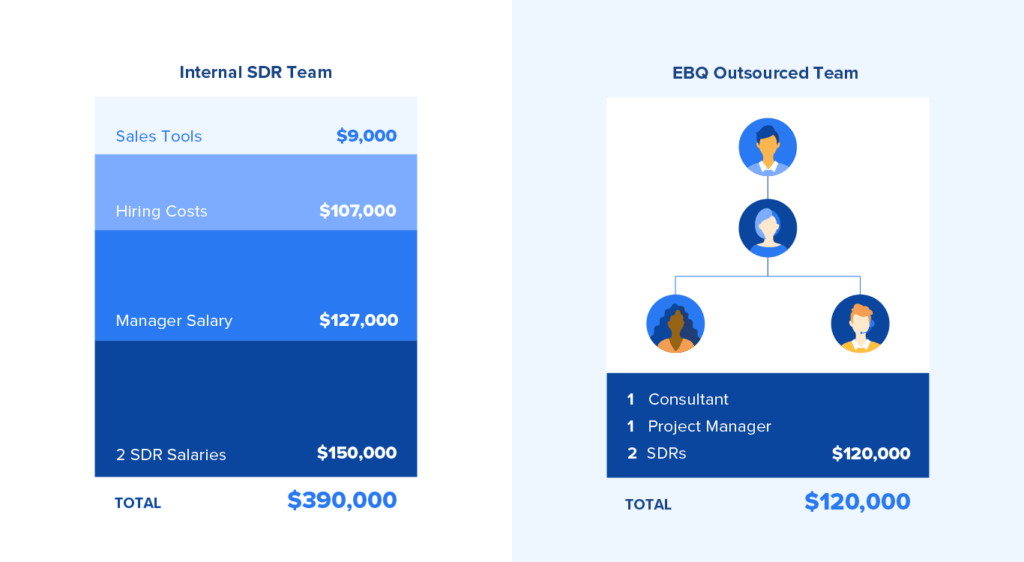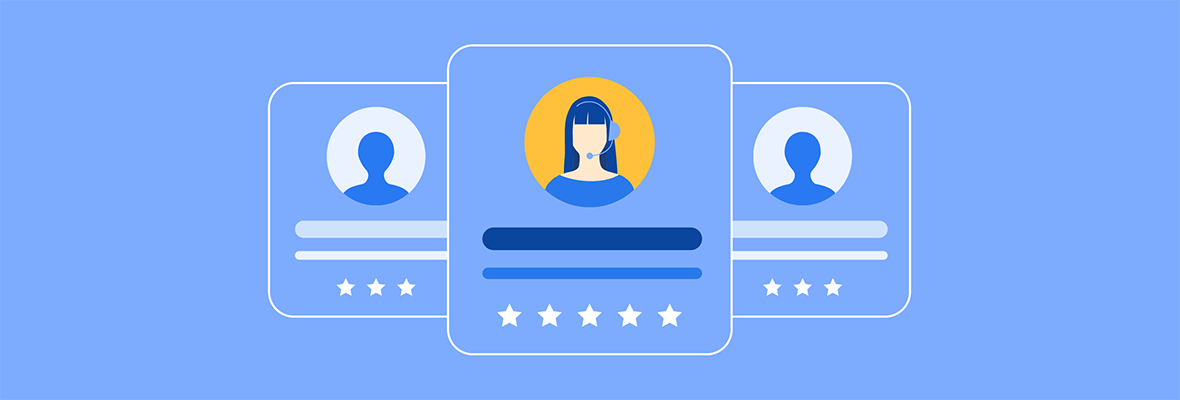In a time of uncertainty, businesses everywhere are looking for both cost-reducing and revenue-generating solutions. As a B2B company, you might be putting a lot of resources into your sales methods and tools — especially around lead generation — to build your initial pipeline.
It’s understandable why you might spend plenty of time, money, and resources on your sales development efforts. An SDR team juggles a lot of important responsibilities to increase sales for your business — such as converting cold and marketing leads and setting sales appointments.
Luckily, there is a way to cut costs while being able to scale your pipeline sustainably. If you’re a business looking to lower costs while producing results, then it may be time you look into SDR-as-a-Service (SDRaaS).
Can hiring an outsourced SDR team really be a cost-effective alternative to having an in-house team? In order to answer that question, we first need to discuss the cost of B2B leads and what SDR-as-a-Service is.
Average cost for B2B leads
One recent study shared that the average cost of a B2B lead is $198. The cost per lead can be much steeper for some businesses as well. For example, companies in the healthcare and medical field pay about $285 per lead. And for businesses in the IT field? They pay a hefty sum of $369 per lead on average.
When looking at these average costs and your own cost per lead, consider how qualified the leads are as prospective buyers. Depending on how they’re generated, different leads have different levels of interest and potential to purchase.
For example, you may be:
- Spending a great deal on marketing campaigns
- Relying on lower cost, organic efforts
- Purchasing cold leads directly from a vendor
Based on the amount of effort and money you’re spending, and on how qualified those leads are, different methods of lead generation deliver different ROI. Generally, the more qualified a lead, the higher the cost will be.
Those IT companies paying over $300 per lead on average could be paying exponentially more for a qualified lead who is actually interested in their solution and ready for a sales conversation.
This is one of the many reasons companies rely on SDRaaS: to lower the cost of both lead generation and lead qualification.
What is SDR-as-a-Service?
SDR-as-a-Service is hiring an outsourced SDR team to handle your outbound lead generation tasks. Relying on an SDR-as-a-Service agency is a cost-efficient method that can alleviate pressure from your company while still obtaining qualified B2B leads.
SDRaaS offers the same that an in-house SDR department provides while keeping costs significantly lower.
Some of those tasks include:
- Cold calling
- Lead nurturing
- Prospect research
- Lead qualification
- Scheduling sales appointments
If you’re still wondering whether you need an SDR team, our post — Is an SDR Team Right for Your Organization? — can help determine if it’s the right choice for your business.
If an external sales development department handles the same responsibilities as an in-house team, then why should you outsource your SDR services?
Why outsource SDR services?
From costs to productivity to expertise, there are a range of benefits that stem from hiring SDR-as-a-Service.
These benefits include:
- Lower costs
- Shorter hiring timeframe
- Requires little onboarding
- Specialized expertise
- More time to focus on other tasks
- A proven process
Looking at a list of advantages that come with an outsourced SDR team should be enough to determine whether SDRaaS is the right business decision, but let’s look at how these advantages compare to an in-house team.
Lower costs
Partnering with an experienced SDRaaS provider means you can save money while receiving the same, or better, quality of services as an in-house team. In a time with increasing prices, it’s important to find a way to reduce costs while still seeing results.
Based on research gathered in a previous post, annual costs of an average internal SDR team include:
- $75,000 in on-target earnings per SDR
- $127,000 for an SDR manager salary
- $107,000 on hiring costs
- $9,000 for sales acceleration tools
In the end, you could be paying almost $400,000 for a complete SDR department. Instead, you can save money and time by partnering with an outsourced SDR team. For example, working with an SDR firm like EBQ can provide SDRs, and built-in management, for nearly a third of the cost.

With SDRaaS, you also avoid the overhead costs that come with an in-house team — such as prospect research tools, computers, and office space. You also don’t need to worry about paying for hiring costs and employee benefits.
Shorter hiring timeframe
Along with virtually no hiring costs for an outsourced SDR team, you also have a shorter hiring timeframe. It can take weeks or even months to find just one SDR for your in-house team.
After finally receiving a list of applicants, you now have to go through the lengthy process of looking for a sales development rep who has the right qualities. This means interviewing candidates through multiple rounds of interviews and potentially still not finding a suitable SDR that meets your needs.
In the end, you are spending time, money, and resources tracking down new SDRs instead of finding new leads.
On the other hand, it could take just days to hire an entire outsourced SDR department who already have the skills and training needed to connect with prospects right away.
When you go with SDRaaS, you avoid the inconvenience of finding and interviewing several, if not hundreds, of applicants. Instead, you already have a full team of competent team members ready to do their part.
Requires little onboarding
Similar to a shorter hiring process, when you outsource your SDR efforts you spend less time onboarding the reps. This is because of the experience they’ve gained by working with similar companies, and their firm provides the majority of training instead of you.
When you onboard an internal SDR, you need to teach every aspect of the job. However, by working with an external SDR team, you only need to provide an overview of your product and your process. This means you get higher productivity much sooner.
Since an outsourced sales development rep already knows how to reach out to prospects, they can start calling sooner than an SDR that needs to be fully trained.
The Bridge Group conducted a study that found it takes about 3 months to fully ramp up a new SDR and that the annual average turnover rate among SDRs is 26%.
By keeping the high turnover SDR role in-house, you’re spending a lot of time and money getting new SDRs up to speed. Collaborating with an external SDR team means you don’t need to worry about turnover since your SDR partner will be handling it instead.
Specialized expertise
Along with a shorter onboarding time, outsourced SDRs often have specialized expertise because of their time working with similar companies. This provides a more in-depth understanding of the market compared to newer sales development reps, so they know how to address specific pain points that your prospects are looking to fix.
For example, our knowledgeable SDRs were quickly able to meet the needs for Seal Software. Their Senior VP of Sales said, “[EBQ was] confident in their own approach, understood our use cases, and converted our strategy to their own methodology to make an impact.”
Because of EBQ, Seal Software saw a 6x increase in sales meetings and built a pipeline worth $7 million. You can learn more about EBQ’s partnership with Seal Software by reading our case study.
Many outsourced SDRs also already have experience working with a variety of tools and processes, so you can have confidence they can work with your unique process. For instance, our SDRs can even work directly out of your Salesforce or HubSpot CRM.
More time to focus on other tasks
With specialized experts generating leads and setting appointments, your internal sales team has more time to focus on other tasks — such as closing deals.
When you rely on your sales team to handle prospecting tasks, you can expect the quality of your pipeline to wane. This is because they are being spread thin trying to cater to all stages of the sales cycle, and sales reps typically prioritize closing opportunities over generating new ones.
With an SDR department dedicated to setting sales appointments, your salespeople will be more productive and win new business more efficiently.
On top of saving time for your sales team, outsourcing to the right SDRaaS partner can also save time for your sales leadership. EBQ provides our sales development clients with two tiers of built-in management to guide both the tactical and strategic aspects of our SDR efforts. This saves clients from spending time supervising day-to-day execution.
A proven process
Since outsourced SDR teams have worked with a variety of businesses, they should have an established process that has been proven to work for many clients over time.
The right SDRaaS firm will be able to provide strategic guidance on developing a variety of your SDR processes, such as:
- A qualification process to keep track of leads
- Call cadences to properly and persistently follow up
- Call scripts and messaging that effectively resonate with prospects
Having a strong, repeatable process helps these experienced SDR teams consistently follow best practices and set more appointments with qualified leads.
Since there are countless perks that come from using SDRaaS, it makes sense for many organizations to outsource. These benefits help take the pressure off of your team members who have other responsibilities. And remember that these perks come at a fraction of the cost compared to an in-house SDR team.
With so many benefits that come with SDR-as-a-Service, how do you know which provider is right for you?
Choosing the right outsourced SDR firm
When it comes to finding the right business to outsource your SDR efforts to, it’s best to consider these factors:
- Pay-per-lead vs retainer: Pay-per-lead companies are motivated to sell you a higher quantity of leads to increase their own revenue, but often put less emphasis on quality. However, firms that are on retainer are incentivized to prioritize lead quality and outcomes in order to continue the partnership.
- Exclusively sells leads to you: Be wary that some firms, especially pay-per-lead ones, may sell the same list of leads to both you and your competitors. Look for a provider who tailors their lead generation efforts just for you.
- Onshore vs. offshore: You may face challenges depending on where the SDR firm is located. For example, outsourced SDRs may encounter communication barriers if you partner with an offshore vendor.
- Visibility into their efforts: The right firm will provide total transparency into SDR outreach and performance. For example, we provide regular reporting to our clients, and we can work directly out of their CRM to build dashboards and track prospect conversations.
For more factors to help you choose the right partner, we recommend reading our post, 11 Things to Consider Before Choosing an Outsourced Lead Generation Service. Keeping an eye out for these components can save you plenty of time, money, and headaches.
SDR-as-a-Service to reduce costs and increase profits
In a time where companies are looking to reduce costs and acquire qualified leads without breaking the bank, outsourcing your SDR team is a viable solution. By hiring an SDRaaS, you gain specialized experts at a fraction of the cost.
Still not sure which SDR company is right for you? Our sales development reps have the skills and experience necessary to expand your pipeline and help you scale. Visit our outsourced sales development services page to learn more.


